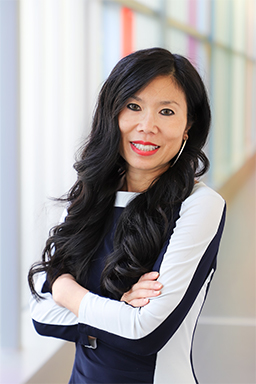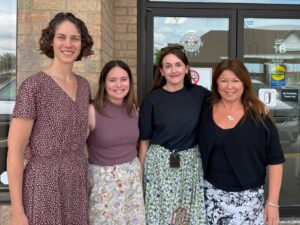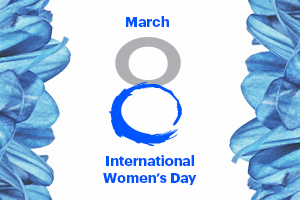

JDRF Canada is thrilled to partner with Michael Smith Health Research BC to award type 1 diabetes (T1D) researcher Dr. Tricia Tang a Health Research BC Health Professional-Investigator (HP-I) award.
A key focus of JDRF is improving the mental health outcomes for people living with type 1 diabetes (T1D). Part of this is creating research partnerships that help extend and further our impact in addressing the gaps in Canadian mental healthcare for people with T1D.
As part of our goal to increase Canadian research capacity in mental health and T1D, JDRF has partnered with Michael Smith Health Research BC, British Columbia’s health research agency, to offer salary support to a researcher working in the T1D field through their HP-I award program. Health Research BC inspires and connects curious, creative, and passionate minds to drive discovery and innovation for better health and health care.,
Collaboration is key to both organizations, as partnership helps to support excellence in health research such as funding outstanding researchers like Dr. Tang; as well as help grow needed research talent and innovation.
The HP-I Program helps close the gap between health research and its implementation to improve health care. HP-I awards support health professionals who are actively involved in patient care to conduct and apply research relevant to health and/or the health system to ultimately improve health outcomes in BC and beyond.
Health Research BC is delighted JDRF are partnering with us to co-fund Dr. Tang’s HP-I award. We value strong partnerships that are integral to fostering world-class health research in BC. Co-funding on Dr. Tang’s award is particularly exciting as her research looks to address access to mental health support for people with T1D living in rural and remote communities,” says Dr. Danielle Lavallee, VP Research at Health Research BC.
These unique awards provide clinicians with protected time for research and as a result, these awards are highly competitive. These awards build research capacity, a goal of JDRF’s Mental Health Strategy, by helping established clinicians drive and grow important research. By receiving this salary support, Dr. Tang can devote more of her time and efforts to research.

Dr. Tricia Tang is an Associate Professor in the Department of Medicine, Division of Endocrinology at the University of British Columbia Faculty of Medicine. She is also a behavioral scientist and registered clinical psychologist with an expertise in diabetes research in high-risk and medically underserved populations. Over the past 22 years, she has focused on developing, implementing, and evaluating low-cost and sustainable peer support models for improving long-term diabetes-related health outcomes.
Living with T1D means a constant balancing act of measuring blood glucose levels and administering insulin to help try and stave off episodes of low and high blood sugars (hypo and hyperglycemic episodes) and knowing that there is a myriad of potential diabetes related complications, including blindness, kidney disease, amputation and even possible death, and while physical health is often addressed for people with T1D, emotional and mental health frequently is not.
It is also known that people living with T1D experience greater risk of mental health challenges, including chronic anxiety and eating disorders. Among the different psychosocial struggles that patients with diabetes experience, diabetes distress (DD), not depression, is most strongly associated with poor glycemic control.
Diabetes distress is defined as when people living with T1D experience a complex range of negative emotions such as stress, guilt, or denial that result from living with a chronic disease and the often-heavy burden of self-management.
In British Columbia, provincial health coverage does not reimburse for psychological services, so frequently a person in need of mental health support cannot-afford counselling or find a qualified provider in their community. Add this onto the additional costs associated with living with T1D (for devices, insulins) and mental health needs simply may not get addressed. Dr. Tang seeks to use digital health strategies and peer support models to close this health care gap.
Dr. Tang’s research goal is to design and evaluate a virtual care platform (REACHOUT) for highly trained peer supporters to deliver psychosocial support to adults with type 1 diabetes (T1D) living in rural and remote communities of Interior British Columbia.
“REACHOUT uses technology to drive low-cost and sustainable mental health support to the doorstep of adults with type 1 diabetes (T1D). This digital health model will increase the availability, affordability, and accessibility of mental health support particularly for medically underserved and geographically marginalized communities. With the HP-I award, I have the opportunity to change the landscape of mental health care for the T1D community in British Columbia,” says Dr. Tang.
REACHOUT aims to be very innovative and highly personalized. Support is delivered by peer supporters who have also experienced diabetes distress and depression; are between ages 19 right through to 90 and from diverse backgrounds; are at different stages of life; and have a wide range of life experiences.
Participants can select who they want to partner with –based on who they believe will best meet their unique support needs at that specific time in their life. And so, selection can change – for example, if a participant gets pregnant and wants to be paired with someone who has already experienced pregnancy with T1D, they can switch. Dr. Tang’s describes REACHOUT as a precision support model where participants, themselves, determine what type of support they want, how much they need, and who will deliver it.
REACHOUT aims to step out of rigid and more traditional thinking to match people with whom they are optimally suited. This virtual model makes peer counselling accessible to everyone regardless of where they live. In many rural, remote areas in BC, people do not even have access to an endocrinologist, let alone access to specialized psychological care. REACHOUT draws on technology and peer support to reach the “hardly reached.”
“I became a trained peer supporter to be connected to a T1D community, I have been living in the interior of BC for 16 years and during this time I have met no other person who has T1D,” says Allan Heel, Vernon, BC, who was diagnosed at the age of 25 and has been living with T1D for 32 years.
“It’s also helped me to have reassurance that the challenges I have with T1D are not unique to me, and to be able to share ideas for how to manage these challenges. I also wanted to participate to improve my insight into diabetes technology, drugs, and treatments that are available or being researched and potentially to participate in clinical trials,” he continues.
“I was excited to join REACHOUT for a couple of reasons. First, there is nothing like communicating with another person with diabetes at my own pace, one on one or in a group, about our common experiences with what can be an isolating disease. I was also excited to work with Dr. Tricia Tang and her team. They’re passionate and enthusiastic about helping people with T1D attend to their mental health in support of overall health and having a great life! I feel lucky to have great people in my corner and to give and receive support with my peers,” says Saffron Henderson, East Vancouver, who was diagnosed at 8-years-old and has been living with type 1 diabetes for 46 years.
Learn more about REACHOUT
More about these awards can be found here.
JDRF will continue to provide updates on REACHOUT, with the hopes that this may be tested in other provinces, and eventually rolled out across the country.
JDRF and Health Research BC looks forward to continuing working together in the future, sharing common priorities such as helping to build research capacity, filling strategic gaps in the health system, and optimizing investments in health research.



